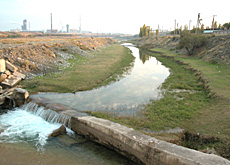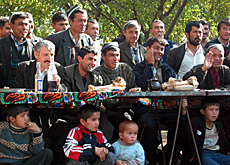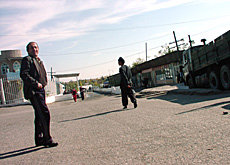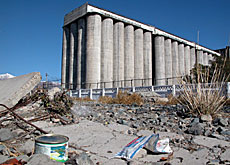Upgrading Central Asia’s water supply

The collapse of the Soviet Union led to the disintegration of a coordinated water policy in Central Asia.
Experts are warning of regional conflict if the former Soviet republics do not work together to manage the supply of water.
Swiss development projects in the region aim to ensure that water does not become a source of tension between populations.
Andrei Yakovlev works for the Swiss Aral Sea Mission, which is responsible for the Regional Centre of Hydrology in the Uzbek capital, Tashkent.
“[The quality of] life will soon make it clear to the governments and people of Central Asia that an optimal water supply for the region as a whole is absolutely crucial,” Yakovlev told swissinfo.
Soviet-era constructions
Yakovlev points out that formerly grandiose Soviet-era constructions – which once pumped water across millions of square kilometres – now lie in ruins.
Although abundant freshwater is to be found in the mountains of Central Asia, the former Soviet republics can no longer afford to tap into the supply.
“During the Soviet era,” explained Yakovlev, “you had just one central committee responsible for water, which was distributed according to where it was needed for farming and energy.
“But with all the different governments now in place, the task [of coordinating] has become much harder.”
Problems frequently occur, says Yakovlev, because water sources transcend national boundaries.
Uzbekistan, for example, relies on neighbouring Kyrgyzstan for much of its water, and the two countries frequently blame each other if there are problems with the supply.
Conflict management
The Swiss Agency for Development and Cooperation (SDC) and the State Secretariat for Economic Affairs (Seco) have been funding three conflict management projects related to water since 1995.
One project aims to install a network of hydrological stations and modernise Soviet-era equipment, while another Swiss-backed initiative is looking at ways of accurately measuring the flow of water.
Up-to-date details about the availability of water are then passed on to the ministries of energy, water and agriculture in the respective countries so that they can work together to coordinate policy throughout the region.
A third project aims to develop software that would be able to predict – and help plan for – future water shortages.
But what sounds promising on paper, says Yakovlev, is extremely complex and costly to put into practice.
“We urgently need equipment, even basic stuff such as simple instruments to measure the water level in rivers.”
Taking responsibility
Development agency officials say they are grateful for the cooperation they receive from government ministries, but argue that logistical support is not enough to improve the flow and availability of water around Central Asia.
“The authorities responsible for water management cooperate very well [with us] when it comes to the exchange of information and experience,” said Yakovlev.
“But what really causes all the problems is the state of the infrastructure,” he added.
Yakovlev warns that development aid is no substitute for government investment, and the Swiss authorities have made it clear to their partners in Central Asia that it is up to individual states to work together and take responsibility for the region’s water supply.
swissinfo, Jean-Didier Revoin and Marzio Pescia in Tashkent (translation: Ramsey Zarifeh)
Swiss development projects in Central Asia are trying to improve water management to avoid regional conflicts.
Conflicts arise because water sources transcend national borders.
Since 1995, Switzerland has been funding three conflict management projects in the region related to water.

In compliance with the JTI standards
More: SWI swissinfo.ch certified by the Journalism Trust Initiative



You can find an overview of ongoing debates with our journalists here. Please join us!
If you want to start a conversation about a topic raised in this article or want to report factual errors, email us at english@swissinfo.ch.